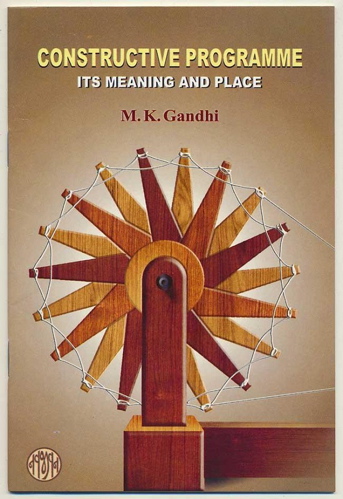Gandhi’s Constructive Programme: The Other Side of Civil Resistance
by Andrew Rigby

Dustjacket art courtesy mkgandhi.org
Gandhi was a special figure in the history of movements for social transformation, and as such has been the subject of countless studies — most recently by activist-scholars and students of civil resistance seeking to identify the key lessons that can be applied to more contemporary nonviolent movements for peace and justice. As such they have tended to focus on the large-scale satyagraha campaigns initiated by Gandhi in the Indian freedom struggle, such as the Salt March of 1930 that inaugurated a mass civil disobedience campaign and the 1942 ‘Quit India’ campaign. Less attention has been paid to exploring the significance and contemporary relevance of the other major dimension of Gandhi’s approach to transformation – constructive action to lay the foundations of new ways of living (what has been called by more recent generations of activists as pre-figurative politics).
Gandhi believed there should be two integral dimensions of any campaign to transform systems of oppression and injustice. There was the front-stage satyagraha, or active nonviolent resistance, but there was also the constructive work to create alternatives to the systems and practices that were in need of change. Indeed, for Gandhi the constructive work was far more important than the active ‘political satyagraha’ in the struggle for emancipation and independence (Swaraj). As he advised his co-workers in 1944, through the constructive programme ‘you can make the villages feel self-reliant, self-sufficient and free so that they can stand up for their own rights. If you make a real success of the constructive programme, you will win Swaraj for India without civil disobedience.’ (1)
Constructive Action as Foundation of the New Society
Gandhi’s understanding of Swaraj was far deeper and broader than political independence from Britain. Self-rule for Gandhi was premised on a fundamental moral-psychological transformation that each person had to experience; it could not be granted by some external agency. As he wrote in Hind Swaraj, ‘It is Swaraj when we learn to rule ourselves … But such Swaraj has to be experienced by each one himself.’ From his perspective, to the extent that people individually and collectively practised self-rule and self-reliance, then they would make British rule irrelevant. As such there was no distinction between means and ends insofar as he contended that, ‘the attempt to win Swaraj was Swaraj itself.’
In this we can see how Gandhi in effect held his fellow-citizens responsible for their own subjugation. The way to achieve the necessary individual and collective transformation that would make Swaraj a reality was for people to transcend the practices that prevented them from achieving their potential as free human beings. And it was in his constructive programme that he began to explore the types of changes necessary.
Read the pdf of the complete article here: Constructive-Programme
EDITOR’S NOTE: Andrew Rigby is Emeritus Professor of Peace Studies, Coventry University, UK, and was for many years a Reader in Peace Studies at the Bradford University School of Peace Studies before leaving to become the founding director of the Centre for Peace and Reconciliation Studies at Coventry University. Andrew was drawn to Peace Studies because of his pacifist convictions, which in turn led to his long association with the British pacifist publication Peace News and with War Resisters International. He has published on such topics as alternative nonviolent life styles, the Gandhian sarvodaya movement in India, the role of forgiveness in nonviolent conflict transformation, biographies of pacifists and philosophers with particular insights into the dynamics of nonviolent change, dealing with the past in societies emerging out of damaging violent conflict, maritime-based nonviolent direct action, and the emotional dynamics of peace-building and conflict transformation. His study of the first Palestinian intifada has been re-published in a fully revised edition as The First Palestinian Intifada Revisited, Sparsnäs (Sweden): Irene Publications, 2015. His most recent book (co-authored with Marwan Darweish) is, Popular Protest in Palestine: The Uncertain Future of Unarmed Resistance, London: Pluto Press, 2015.




